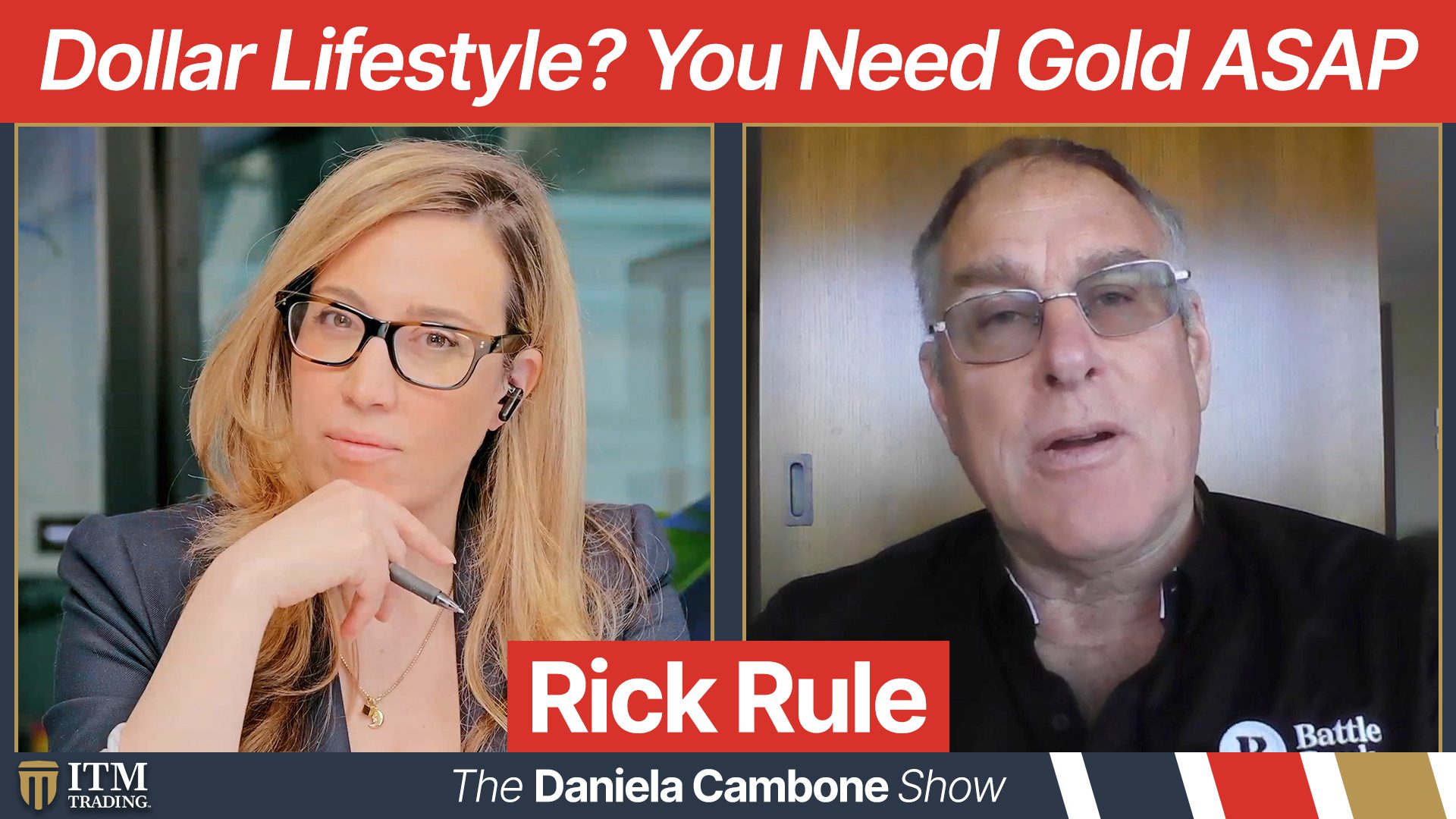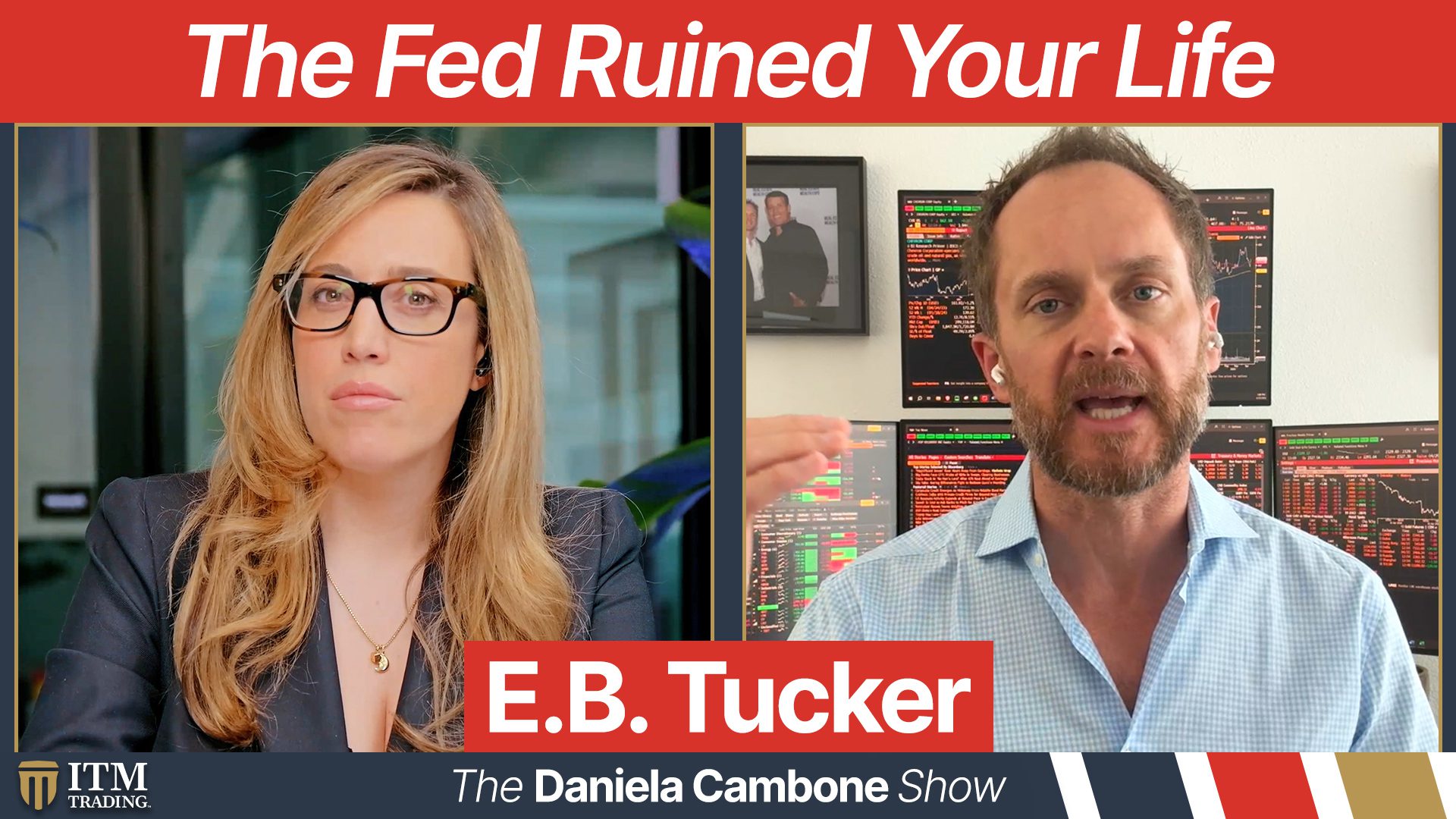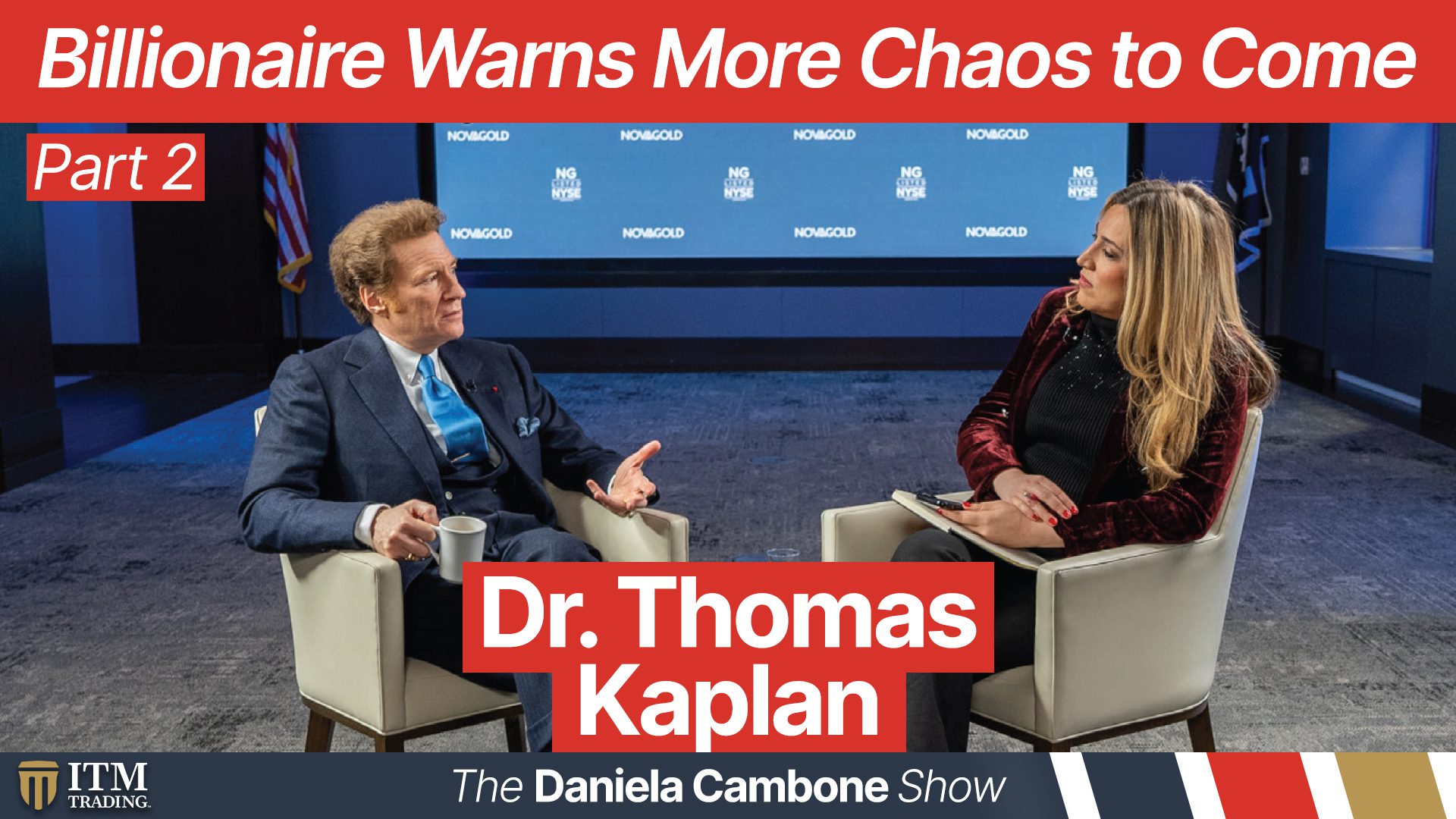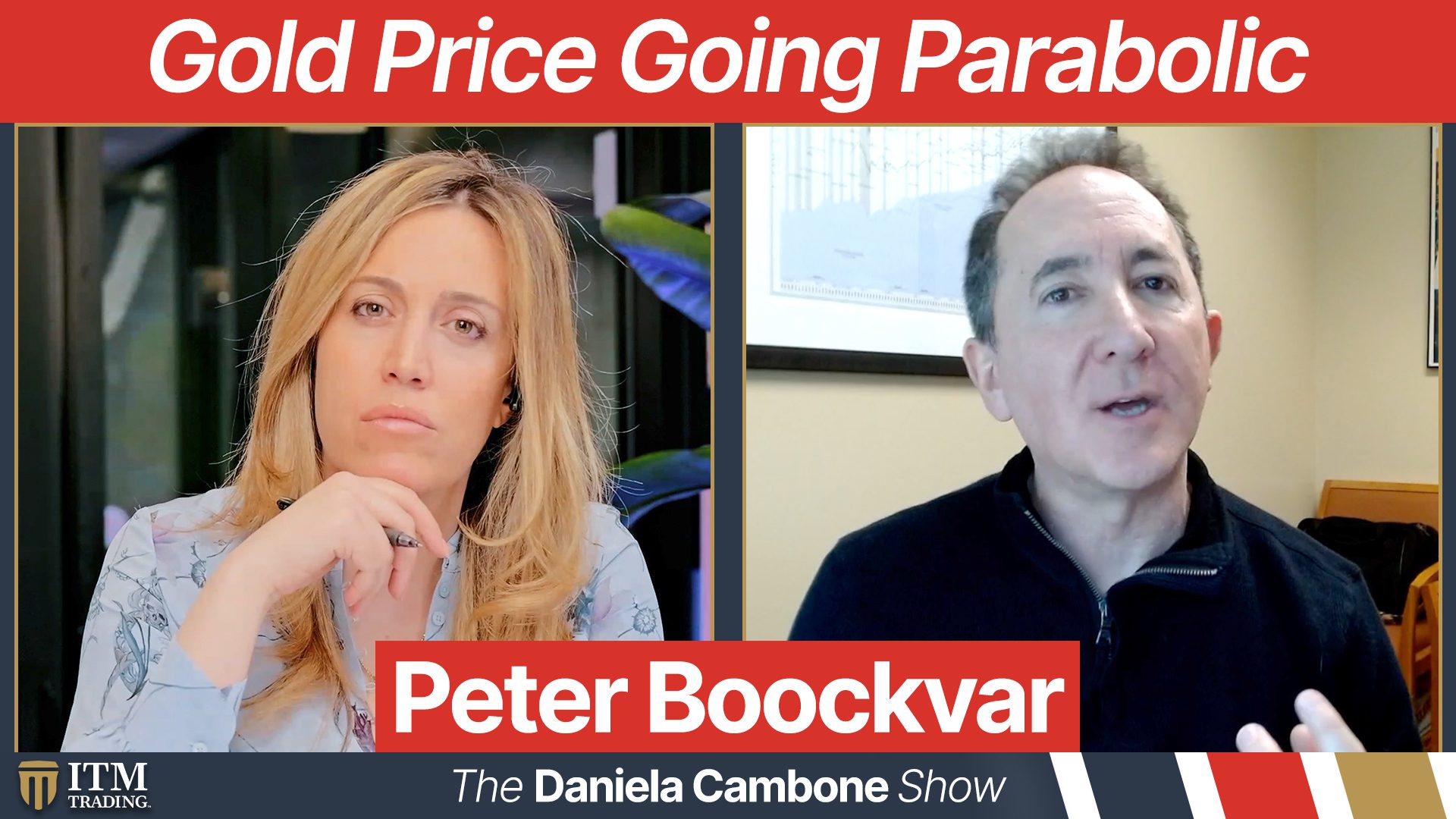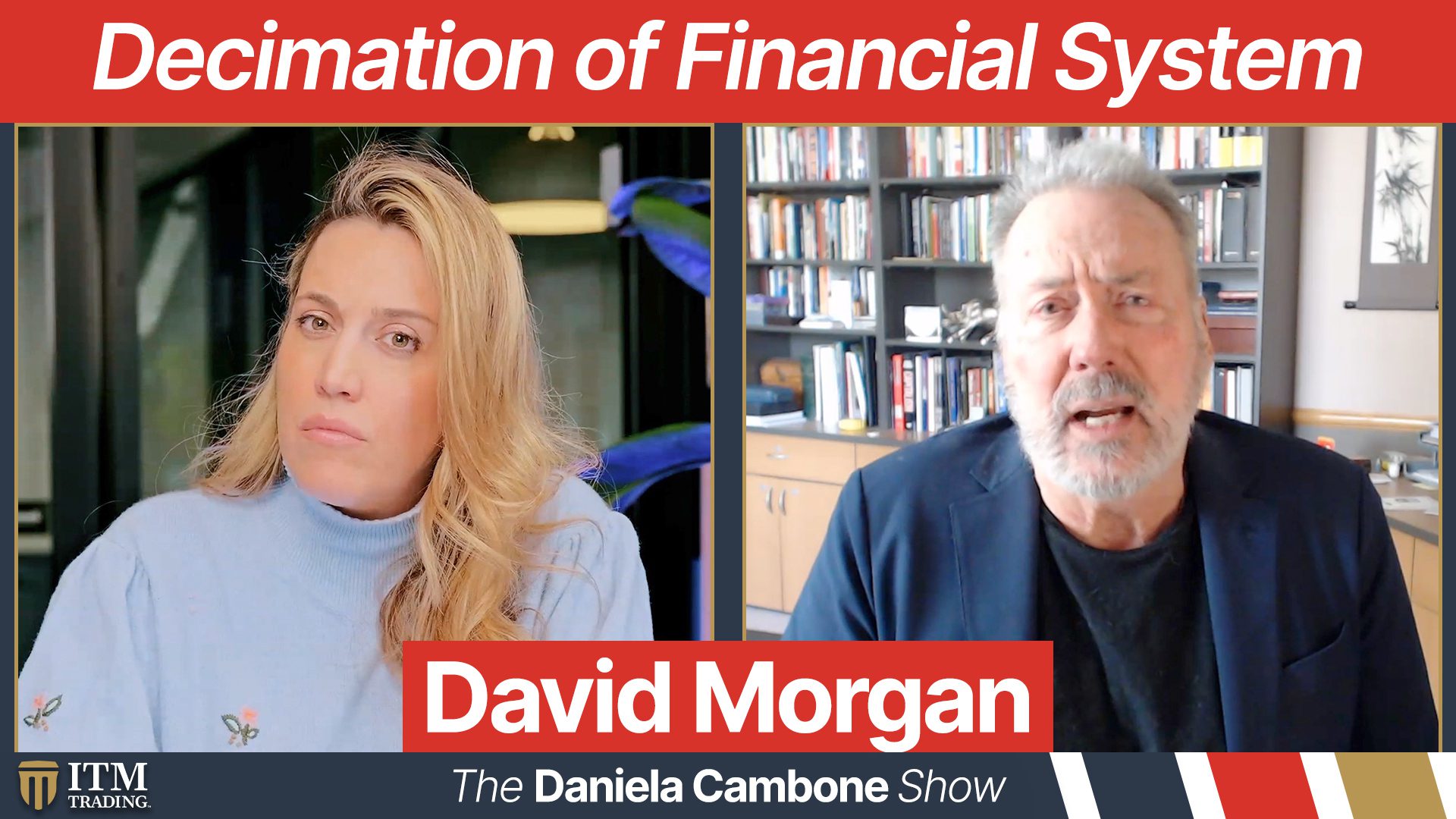Top Economist Steve Hanke: Incoming Regulations Will Actually Trigger the Next Banking Crisis
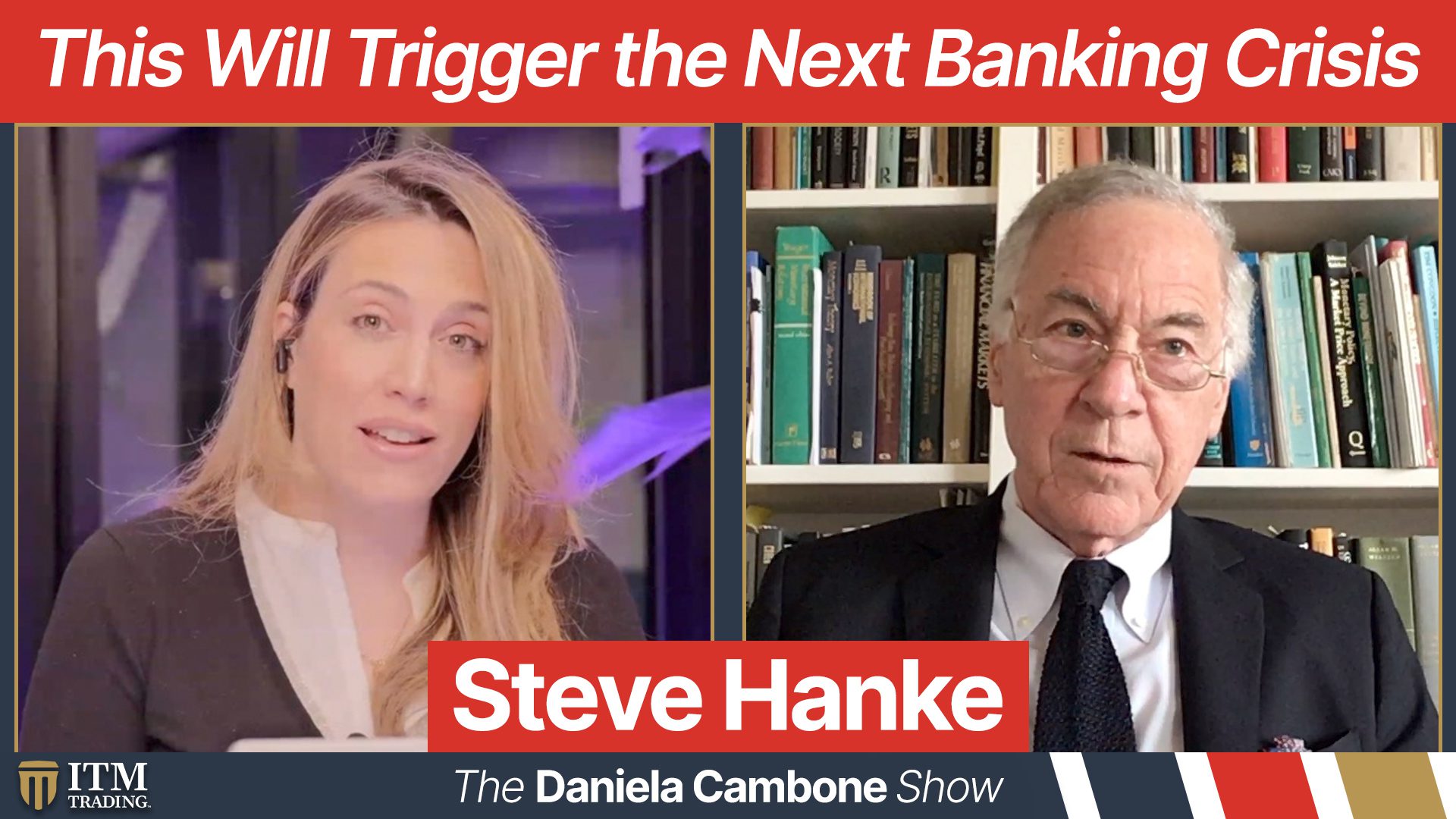
Professor Steve Hanke joins Daniela Cambone to discuss the current state of the economy and the potential for another banking crisis. He explains why the economy is weaker than the headlines suggest as well as how Fed policies have fueled inflation. Daniela Combone and Prof. Hanke also analyze the risks in the banking sector, the elections, funding the war in Ukraine, and the role of gold. Watch this fascinating discussion you won’t want to miss.
CHAPTERS:
0:00 Expectation for the Economy
5:00 Quantity Theory of Money
7:38 Weakness in the Labor Market
11:57 Fed’s Narrative on Inflation
20:38 Health of the U.S. Banking Sector
26:05 Argentina’s Economy and Dollarization
30:21 Russian Assets for Ukraine War Aid
32:48 Assessment of the Gold Market
TRANSCRIPT FROM VIDEO:
00:05
This is Daniela Cambone. Welcome back to the Daniela Cambone show, now on ITM Trading. Well, my guest today says, expect the stock market to retreat, a recession to strike, and inflation to fall below 2%. Joining me today is Professor Steve Hanke. He’s a professor of applied economics at Johns Hopkins University, and he’s a former economic advisor to Ronald Reagan. Professor, always good to be with you. Welcome back. Great to be with you, Daniela.
00:34
So let’s see, reading your recent remarks, you expect the stock market to retreat, a recession to strike and inflation to drop below 2% by the end of the year. My opening question to you, Professor, is how will this all be possible? Well, if you look at the data coming in today, you have to say, what’s this guy smoking? The economy looks…
01:02
pretty good. The stock market is roaring away and inflation, although it continues to come down, contrary to the reports we were getting a couple of days ago, it actually fell from 3.4% year over year to 3.1% and it will go down to 2% or below by the end of this year. So that’s the inflation part of the thing.
01:31
The stock market is really difficult to predict, but it’s usually related to recessions. And recessions and economic activity do play a role in the stock market because earnings and free cash flow are generated from economic activity.
01:56
We think a recession is baked in the cake. John Greenwood and I, who I work with on these kinds of things, think a recession is baked in the cake for later this year. Now if that happens, the stock market will come down because free cash flows will come down, earnings will come down, and multiples, which are very high, will adjust and come down. Now,
02:23
Why do I say this is all baked in the cake and I’m so certain about it? I’m certain about it because I, with Greenwood, are using the quantity theory of money. That is the theory behind what’s determining the course of the economy, nominal GDP. And remember, nominal GDP has two components, the price level and real.
02:51
rates of growth. So rates of growth in prices and rates of growth in inflation. If you add those two together, you get nominal GDP. And it’s very accurate to use the quantity theory and predict what’s going to happen with nominal GDP. So why is it difficult for people to get their head around this? It’s difficult because…
03:21
There are big lags between changes in the money supply and changes in asset prices, changes in economic activity, and ultimately changes in inflation. So it’s the lags that are the problem. And when I say baked in the cake, all of this was baked in the cake a year and a half or two years ago when the money supply started going south.
03:48
and has been in negative territory. It’s down about four and a half percent since March of 2022. That’s a big slide. It’s only happened four times. That kind of thing has only happened four times in American history. And the biggest one, of course, we had to get to the four and a half percent level to get down that low.
04:17
in a contraction, you have to go back to 1929, 1933. We had a big contraction then, you know what happened. We had a great depression. We had a much bigger contraction by the way than the current one. But in any case, all these four cases, when you go way back and look at the contractions that have occurred, we have always seen that they’ve been followed by a recession. And that’s why I’m saying,
04:47
think the recession is baked in the cake because we’ve had this big contraction and contractions always lead to slowdowns and nominal GDP. Help me understand this, Professor. So two points, right? Baked in the cake, unless there were to be a reversal in the money supply, I mean, could not another crisis hit and all of a sudden… Okay, that’s true. That’s true. But remember…
05:16
the big lags that occur. Even if the money supply was reversed today, it would take a year and a half or two years before that would show up in the economy. These things aren’t like turning a switch on. And the lags are long and variable, which makes it very difficult to pinpoint exactly when things are gonna go south or when they’re gonna boom.
05:45
For example, let me give you an example. Greenwood and I originally, once we saw that the Fed had switched into reverse and started contracting the money supply, we thought that we would have a recession by the end of last year. That was our original prediction. It turned out to be wrong. We were way ahead of things.
06:11
And the reason for that is that there had been such a huge buildup in excess money created with the huge expansion in the money supply that led to this big excess and inflation, which we got the inflation part right, by the way. We said inflation would go up to 9 percent. It went up to 9.1 percent. So the inflation thing we got right. The recession thing we didn’t get right.
06:41
And the reason was this big excess was draining off and coming back to a normal level at a much slower rate than was typical. So once Greenwood and I saw that, we changed our forecast. And instead of the end of 2023, the recession arriving, we did a reforkest for the end of 2024.
07:11
And we did that because of looking at the data and the data were changing. And to quote John Maynard Keynes, if the data change, I change my mind. What do you do, sir? Or I should say madam. Okay. Help me make, sorry, please. So the lags are tricky. That’s what’s tricky about the thing.
07:39
The second point I want to bring up, I want you to help me make sense of it for the folks at home, right? Because you mentioned the strong economy and we see the headlines that were being told. The jobs numbers, consumer confidence, great. But on the flip side, we hear, you know, we’re seeing all the layoff numbers, you know, paramount, paramount just yesterday, 800 jobs, Cisco, Instacart, Wayfair. I mean, the list goes on here of job cuts, job cuts, job cuts.
08:09
you’re talking about a recession. So, and I would argue that most people, whenever they hear, oh, it’s a strong economy, the first pushback I get is like, for whom? Not for the middle and low income class here. So help us make sense of the reality today of the economy because like I said, most people are saying they keep telling a strong economy but they’re not feeling it or seeing it.
08:38
Okay, that’s a good point because if you kind of look at the headline numbers for the job market, for example, the unemployment rate, if that’s all you were looking at, it’s down pretty low. But if you look under the hood at more detail of what’s going on in the economy, weakness is starting to show up. As you get out in the weeds and drill down and things.
09:08
You see that that headline number is a little bit of a mirage, if you will. It think things are not, they’re starting to turn south already. So I would argue that the labor market’s probably weaker than the headline that’s advertised and remember you have a lot of
09:34
political propaganda that comes out of Washington DC, the Federal Reserve, the White House, etc. etc. And the headline that they have and the message and narrative that they have is that everything looks great. And they point to things like the stock market. The stock market, you know, that’s an objective number. The stock market indices, that’s for real. And the unemployment rate, it’s a real number.
10:03
But again, looking forward and looking under the hood, you find that things aren’t really quite as rosy as a headline would make you believe. That’s basically my thinking. Exactly. So things are not as good as they seem. And to your point on inflation, right? Because I’m sure you get the pushback.
10:33
we’re not seeing, look, even the president talking shrinkflation during the Super Bowl, but they’re not feeling prices coming down. No, they’re not feeling prices coming down because number one, they’re still going up. The rate at which they’re going up is slowing down. The rate that they were going up at the peak was 9.1%.
11:01
But now we’re talking about 3.1%. So the rate of increase is slowing. It’s not going up as fast as it was, but it is going up. Point number one, that’s the rate of increase. The level of prices is another thing. And the level of price is a lot higher than it was in 2020 before all this started. And that’s what people realize. They think.
11:30
They think in terms of, well, what were things costing two or three years ago? And they were costing a lot less than they’re costing right now because we’ve had this huge run up in prices and the price index, including everything, all 300 plus items that are in the consumer price index, they literally have all gone up in the last couple of years.
12:00
the Fed and political propaganda we’re consuming. I’m sure you caught Fed Chair Powell’s discussion on 60 minutes. I wanna get your take on, I mean, he rarely gives interviews, obviously felt the need to explain what’s happening with rates. So your insights on what the Fed is doing right now.
12:25
Okay, well the Fed, we have to start, what is the narrative that they put out? Let’s just walk through this like a point by point, kind of a lecture type thing. What is the narrative? The narrative that’s being put out by the Fed and the White House on this inflation cycle that we’ve had and run up in prices is that these inflation…
12:54
bursts that we’ve seen have all been created by two things, either problems that we’ve had in the supply chain or problems that we have had with commodity prices going up as a result of usually they say the war in Ukraine. They put it on the Russian back. So that’s the narrative. And the narrative never includes changes in the money supply. That’s left out.
13:25
Now, I have, by the way, about two weeks ago there was a big lead article signed by four journalists in the New York Times. Their top four reporters on finance and economics signed off on this article, and it gave the standard narrative. And that is all this inflation talk is all about non-monetary things. They mentioned supply chain, commodity prices.
13:55
all kinds of ad hoc things that by the way have nothing to do with the Fed or the White House. These are external shocks that came into the system and caused the inflation. Washington didn’t cause the inflation. The Fed didn’t cause inflation. And that’s just nonsense. Inflation is always and everywhere a monetary phenomenon. They never talk about changes in the money supply. So let’s get to the money supply. What is the money supply?
14:25
The money supply broadly measured, M2, is made up of the following things. Currency makes up about 11% of it. About 76% is made up of deposits at commercial banks. About 5% are small time deposits at commercial banks. And about 8% is made up of money market funds, retail money market funds. That is what the money supply is.
14:54
Now what happened to the money supply? After February of 2022, it shot up. And by February of 2023, it had gone up, it was peaking at about 27% year over year, the rate of growth. Now a rate that’s consistent with hitting a Fed inflation target at 2% is about 6%. So you can see it was almost four times higher
15:24
than what I call Hankey’s golden growth rate, 6%, a rate for growth that would be consistent with hitting 2%. So what happened? As Greenwood and I predicted, inflation went up. We said it would go up as high as 9%, while it went up to 9.1%. Now, how do we know this? We know this because money is the fuel for the economy.
15:51
And the quantity theory of money is a theory you use to analyze what’s going to happen with nominal GDP, the changes in prices plus changes in real GDP. And there’s a proportionality between rates of change in the money supply and inflation. I did a study that was published in World Economics in September of last year.
16:19
I looked at 139 countries between 1990 and 2021, and I looked simply at the rate of growth in the money supply and the rate of growth in prices in those 139 countries over that 1990 to 2021 period. And what did I find? I found something very close to proportionality, and that is I didn’t get a one-to-one relationship
16:47
But the correlation was 0.97. It was almost one to one. You change a money supply by 1%. You get a 1% change in the price level. Or 10%. You get a 10% change. So money is the thing that’s not in the narrative. If you read the newspapers and the financial press.
17:12
You have to remember Hankey’s 95% rule. 95% of what you read is either wrong or irrelevant. Now why is it wrong and why is it so systematically wrong in this inflation cycle? Because the press is bought into completely the narrative that’s been handed to them by the Fed. And there’s a compliment. European Central Bank and the Bank of England have exactly the same narrative.
17:42
The other central banks around the world don’t, but the other central banks around the world don’t have the kind of inflation problems, the big ones anyway, that we’ve had. In other words, to make a long story short, the Fed lies. And why does the Fed lie? Because they don’t want the noose around their neck for being the culprit that caused inflation. And they say it’s all because of oil prices.
18:12
commodity prices, supply chain problems, all these other things that have nothing to do with the Fed. And professor, does it become amplified because it’s an election year? Do they not want to be blamed for how the course or the course that the election cycle will take? They never want to be blamed. Now, this is typical by the way of all central banks.
18:41
So all central banks do this. When inflation comes out, they come up with some non-monetary reason for why the inflation occurred. Wage price increases, oil price increases, supply chain problems, you name it. They’ll have a million things, and they’ll never talk about changes in the money supply, which is something that’s their responsibility, is changes in the money supply and monetary policy.
19:10
The election year does magnify that because, you know, when people go to the polls and one of the big problems they have is inflation. And they know very well, I mean, I can remember just earlier this week, I went to the grocery store to buy a box of cereal and the thing was like $7.
19:36
This was Quaker Oats and I was talking about sticker shock. So that’s what’s facing everybody all the time or buying new tires for their car or getting a repair job or clothes or whatever it is, they know they’re paying a lot more than they were three years ago. That’s all it’s registering. And they don’t register that, oh, things are getting better.
20:05
We were at 9.1% inflation year over year, and now we’re only at 3.1. They don’t think about that. All they know is what they pay when they go to the store. Exactly, exactly. So this is a big problem for all the incumbent politicians, and it’s a big problem for the Fed, but the Fed’s done a pretty good job, by the way, of changing this narrative.
20:33
and getting the news off their neck. Another, you know, talking point of Powell’s during the interview was about the banking crisis. I want to get your thoughts. He said, it’s unlikely we will see another real estate led banking crisis. And now Federal Reserve Vice Chair for Supervision Michael Barr just said this week that recent turmoil in the regional banking sector is not indicative of problems in the broader banking system.
21:00
Professor, your thoughts on the health of the U.S. banking sector right now. Could we see another crisis? Well, let me tell you why they’re peddling the crisis story first. They bar at the Fed wants to increase the regulations on banks. And he wants in particular to increase the capital asset ratios of banks. He wants them more capitalized.
21:30
Now, what that, so that’s why they’re peddling this crisis thing. Bankers are dangerous. Bankers are bad. We had this with me. Remember the great financial crisis in 2008 when Lehman went under and the subprime mortgage crisis, what did we have? We had a whole host of new bank regulations with Dodd-Frank to tighten the screws on banks and what happened with banks?
21:59
The loans of banks went down. The money supply started shrinking because the bank loans went down. So what they’re doing, they want to regulate banks more. They want the capital asset price ratios to go up at banks. And to do that, they have to have a narrative that justifies more regulation. And they have to tell us that banks are unsafe and we’re gonna have a crisis if they don’t regulate them.
22:28
That’s what the whole thing is about. Now from a monetary policy point of view, this is total stupidity because this will shrink the money supply even more because loans are actually flat now. Loans have not been growing in the United States. And what does that mean? That means the contribution, the biggest contribution to the money supply is the credit created by commercial banks.
22:56
Remember when I said the definition of M2, 76% of it were deposits at banks. Now how do you get those deposits? Well one big way you get them is when a bank makes a loan to Daniela, what does she do? You increase your deposit at the bank and that increases the money supply.
23:21
So 76% of M2, the broadest measure of money in the United States, is made up of deposits of banks. And those are created by banks. Most people just don’t get this. Who creates most of the money in the economy? Commercial banks do. Remember, 11%, only 11% is created by currency.
23:51
That’s the Fed. The Fed directly creates currency. Notes and coins are created by the Fed. That’s 11%. The 76% is largely created by commercial banks. It’s created privately. So what’s your, I mean, what’s your take when, once, you know, some experts say, well, we still need some flushing out of, you know, at the regional bank level, there’s way too many banks. I think this is a great exaggeration. I think the massive exaggeration.
24:21
And these regulations will make things worse, not better. The regulations might create a crisis or more problems in these mid-sized banks. And the reason for that, by the way, is that if you increase the capital asset ratio of a bank, how does the bank adjust and meet those new requirements?
24:49
It can issue new capital, but if they don’t want to do that, because if they issue new capital, that dilutes the existing shareholders. So they’re not inclined to do that. So they go to the denominator of the capital asset ratio and they try to shrink that. And that means to shrink loans, not to turn over loans, not to extend credit. Do you think the mindset should be like, well, look, if you have, you know…
25:18
over $220,000 in deposits in the bank that maybe you should just avoid regional banks. Why take on that risk? Well, I mean, that is one way to avoid it. If you don’t want any risk in your deposits, you spread it around so they’re all covered. I mean, de facto, they are, as we found out in the last crisis, de facto, they are all covered. But de jure, they are all covered.
25:45
they are not. So if you are concerned about the risk associated with your deposits because they’re too large and some of them are uncovered, you know, open another bank account and spread it around.
26:05
Professor, I know you’ve been obviously writing a lot about Argentina and I’d love for you to share some of your thoughts about what you think, you know, your assessment really of Malay and, you know, his shock measures as they call it that he’s doing to the economy there. I mean, I’m sure you caught his speech in front of the World Economic Forum where he urged, you know, the Davos elite to reject socialism.
26:32
Your thoughts on Malay and what he’s doing for Argentina. Okay, so first of all, Argentina is in a mess and they’ve been in a mess for quite some time. And I know a little bit about it because I was president of Carlos Menem’s advisor from 1989 to 1999. So my take on the thing is as follows.
27:00
The inflation rate, which I measure every day in Argentina, is 199% per year. So if Malay doesn’t get that down, he’s basically toast. He has a lot of good ideas about deregulating the economy, privatizing the economy, liberalizing the economy, getting rid of a lot of these really insane regulations that they have.
27:29
in Argentina. So all of that’s fine. All of that’s great. He’s had a big pushback on his omnimous bill, which he had a whole host of reforms that were contained in that bill. Basically, the Congress threw it out, threw it back in his lap. So why doesn’t he do what he should do as step one? And step one is to dollarize the economy, get rid of the central bank.
27:59
something that I proposed originally in 1981, and also get rid of the peso, which I actually drafted a law for President Menem in 1999 to dollarize the economy and get rid of the peso. So that’s what he should have done as step one, because that would have killed inflation, that would have given him credibility and political support, which would have allowed him.
28:28
to push through many of these needed reforms to liberalize the economy. Unfortunately, his Minister of Economy, Louis Caputo, has not followed that course of action. He’s got the sequence of things all wrong. He’s basically following an IMF sequence. He’s trying to balance the budget first and fix everything.
28:57
in the economy first and then get around to dollarizing after everything is fixed. Well, if everything is fixed, why in the world do you have to dollarize in the first place? I mean, I’ve done two of these dollarizations myself, one in Montenegro in 1999 and the other in Ecuador in 2000, 2001. And there are no preconditions. You just do it. And that’s what he should be doing. So my view is…
29:25
that he should be doing this and doing it now. Last week Steve Forbes came out with a powerful interview on YouTube in which Forbes said exactly what I’m telling you and Forbes is exactly right. I think Malay has just missed the boat. He campaigned on dollarization. That he was going to get rid of the pay so he was going to get rid of inflation. He was going to use the US dollar in Argentina.
29:54
which by the way privately everybody does anyway, but he was gonna do this officially and he won the election because of that. And then all of a sudden he takes the presidency, he appoints someone who’s not a big fan of dollarization, Caputa as his finance minister and Andy’s put dollarization on the shelf and isn’t doing it. So I think he’s made perhaps a fatal mistake in sequencing.
30:22
Speaking of fatal mistakes, I want to ask you if this could be one. I want to bring it back to the United States to the election. And yes, Ukraine will be top of mind when it comes to the election. Your thoughts on Speaker Mike Johnson floating, confiscating Russian assets to fund Ukraine war aid. He says it would be pure poetry, but insiders I’ve spoken to, professors say this could potentially be catastrophic.
30:50
What are your thoughts on the word you said? All these aspects of weaponizing the financial system and the dollar system are bad news. I mean, basically it’s theft. So I don’t think theft is a very good attribute. This is Washington BS. And the dogs of war are out. And they’re financing this war. If we wanted the war to stop.
31:18
and stop killing people and destroying Ukraine, the US should cut off the funding and not fund it. It’s the same in the Middle East. If you want the war in Gaza to stop, the US has to stop funding it. Who’s funding these things? And that’s the tip of the iceberg, the funding, because they’re sending weapons, they’re involved in intelligence. The US is being sucked into these things big time.
31:48
And this is a dangerous course to be on. It’s a treadmill and it’s not a good one to be on. And a never ending war is a bad thing. And we’ve been in a never ending war since 9-11 in the United States. So this is a big problem and a big potential risk. Risk to the dollar to…
32:17
World War III risk to what? All of the above. You never know. I’m not predicting because, Daniela, it’s like flipping a coin. The coin is in the air and I’m not in the business of telling you whether it’s gonna land heads or land tails. Once you’re engaged in a never ending war, the coin is up in the air. And no one, by the way, has a very good idea.
32:46
of how it’s going to land. Well said, professor. Just a final thought from you, a big chunk of our audience obviously interested in the gold market, wondering, is gold doing what it should be doing? Should it be higher? Your assessment of the gold market. My own view is that it’s going higher. Based on everything happening, obviously? Well.
33:15
The geopolitical tensions or? There are many factors, the most blatant one is that central banks are continuing to buy quite a bit of it. And why are they buying it? Well, they’re buying it because of these risks and this weaponizing of the US financial system and the US dollar. I mean, I think that, I think the weaponization aspect is…
33:42
That’s obviously why China is loading up and why Russia is loading up. It goes without saying. Professor, I thoroughly appreciate your time. I know you gave us lots of it today. I felt like I was in one of your lectures today. I just love learning from you. So I thank you. It’s truly a gift. Thank you. Well, thanks for having me. It’s great to be with you. Have a great day. Thank you, Professor. And thank you all for watching.
34:10
Great content coming your way, so be sure to stay tuned to the Daniela Cambone Show here on ITM Trading. Thanks for tuning in.
SOURCES:
https://engineering.jhu.edu/faculty/steven-hanke/
https://x.com/steve_hanke?s=20
https://www.gc.cuny.edu/people/john-d-greenwood
https://www.nytimes.com/2024/02/02/business/economy/jobs-report-january-2024.html
https://www.cnbc.com/2024/02/13/paramount-global-lays-off-about-800-employees-after-super-bowl.html
https://fred.stlouisfed.org/series/M2REAL#
https://www.youtube.com/watch?v=QdZoxdYSP0E
https://finance.yahoo.com/news/problem-ll-working-years-fed-202107790.html
https://www.aa.com.tr/en/americas/former-argentine-president-dies-at-90/2144847
https://www.youtube.com/watch?v=7dqoffK6Yls
